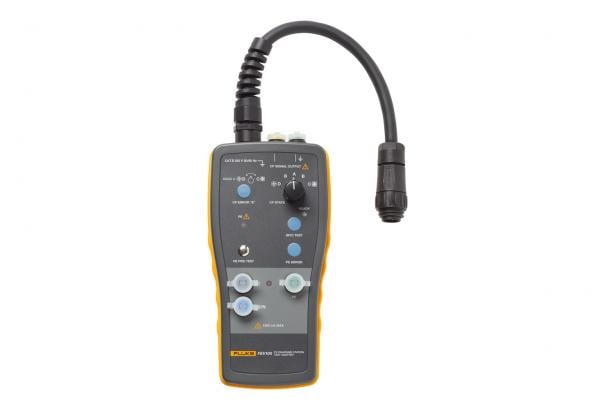Fluke FEV100 Electric Vehicle Charging Station EVSE Test Adapter
Key features
- Check protective earth for correct wiring and functioning with the PE pre-test feature.
- Perform GFCI troubleshooting of EVSE and verify operation within safety standards.
- Test charging states of EVSE with CP state simulation.
- Verify charging voltage and maximum available current using a multimeter.
- SAE J1772 compliant to North American standards.
Product overview: Fluke FEV100 Electric Vehicle Charging Station EVSE Test Adapter
Test the safety and performance of a type 1, level 1 or level 2 electric vehicle ac charging stations (EVSEs) with the Fluke FEV100. This test adapter simulates the presence of an electrical vehicle, allowing you to conduct tests in combination with appropriate test instruments such as a digital multimeter or oscilloscope. Use the FEV100 to verify an EVSE is working properly after install and during periodic maintenance, or troubleshoot an EVSE if it is not delivering the appropriate charge.
Electrical safety
EVSE charging cables may become damaged over the course of use, increasing electric shock risks to users. Stay protected from and check risk of electric shock with the GFCI trip test. This function verifies the breaker of the EVSE is connected by detecting ground faults. Additionally, the PE grounding protection pre-test verifies that there is no presence of dangerous voltage at the ground terminal.
Simplicity and convenience
Perform a variety of tests including ground fault checks, insulation of wires, measuring voltage and duty cycle to see max current available for charging all in one adapter that safely integrates with the Fluke portfolio of test and measurement tools. There is no need to bring an electric vehicle onsite for EVSE troubleshooting: the adapter acts as an electric vehicle when connected to an EVSE for easy performance and maintenance testing.
Recommended tools for use with the FEV100
- 87V Industrial Multimeter
- 376 FC True-RMS Clamp Meter with iFlex
- 1587 FC Insulation Multimeter
- 1738 Three-Phase Power Quality Logger
- 1630-2 FC Earth Ground Clamp
- BT521 Advanced Battery Analyzer
- 1664 FC Installation Multifunction Testers
- 125B Industrial ScopeMeter® Handheld Oscilloscope
- TL224 SureGrip™️ Insulated Test Leads
What's in the box:
- Fluke FEV100/BASIC Test Adapter
- Fluke FEV-CON/TY1 Type 1 Connector & Cable
- Soft Carrying Case
- User Manual
- 3-year warranty
Specifications: Fluke FEV100 Electric Vehicle Charging Station EVSE Test Adapter
| General specifications | |
| Input voltage | UL1/N = 120 V, UL2/N = 120 V, UL1/L2 = 208 V, 60 Hz (three-phase system) or UL1/N = 120 V, UL2/N = 120 V, UL1/L2 = 240 V, 60 Hz (single-phase system), ±10% voltage fluctuations from nominal |
| EV connector (EVC-13) | SAE J1772 socket, 16 A (type 1, 5P single-phase) |
| Internal power consumption | 2 W max. |
| Operating temperature | -4 °F to 104 °F (-20 °C to 40 °C) |
| Storage temperature | -4 °F to 122 °F (-20 °C to 50 °C) |
| Operating humidity range | 10 % to 85 % relative humidity non-condensing |
| Storage relative humidity | 0 % to 85 % non-condensing |
| Operating altitude | 6561 ft (2000 m) max. |
| Dimensions (H × W × D) | Approx. 8.66 x 4.33 x 1.77 in (220 x 110 × 45 mm) without cable assembly |
| Weight | Approx. 4.4 lb (2 kg) |
| Safety standards | IEC 61010-1, Pollution Degree 2 IEC 61010-2-030 |
| Measurement category | CAT II 250 V |
| IP protection class | IP54 |
| Electromagnetic Compatibility (EMC) | |
| International | IEC 61326-1: Basic Electromagnetic Environment CISPR 11: Group 1, Class A Group 1: Equipment has intentionally generated and/or uses conductively-coupled radio frequency energy that is necessary for the internal function of the equipment itself. Class A: Equipment is suitable for use in all establishments other than domestic and those directly connected to a low-voltage power supply network that supplies buildings used for domestic purposes. There may be potential difficulties in ensuring electromagnetic compatibility in other environments due to conducted and radiated disturbances. Caution: This equipment is not intended for use in residential environments and may not provide adequate protection to radio reception in such environments. |
| USA (FCC) | 47 CFR 15 subpart B. This product is considered an exempt device per clause 15.103. |
| Functions | |
| CP States | A, B, C, D |
| CP Error “E” | On/off |
| PE Error | On/off |
| GFCI Test | Yes, test resistor of 2 kΩ connected between L1 and PE, time limitation 40 ms |
| PE Pre-Test (typical) | Visible indication >30 V on PE conductor |
| Outputs (for test purpose only) | |
| Measuring terminals L1, L2/N, PE | Max. 250 V 50/60 Hz, CAT II 250 V |
| CP signal output terminals | Approx. ±12 V (under normal conditions), in case of wrong wiring or error of the charging station these terminals can be hazardous ≥ max. 250 V against PE |
Models: Fluke FEV100 Electric Vehicle Charging Station EVSE Test Adapter
UPC#: 1 95112 01500 1







